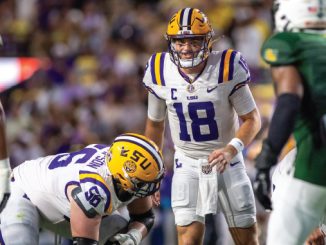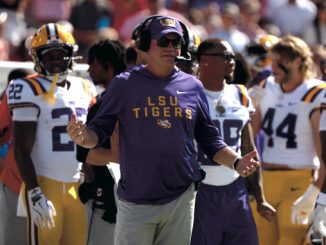
There’s an overload of talking sports heads who yap incessantly just to be heard.
The louder they talk, the more they think their opinions carry weight.
Chris Fowler isn’t one of those announcers.
The 57-year old Fowler has worked for ESPN for almost 34 years, starting as the host/reporter of Scholastic Sports America, eventually serving as host for College Football GameDay for 14 seasons and has been the play-by-play voice for ABC/ESPN’s Saturday Night Football and the College Football Playoffs for the last five years.
He is the consummate professional, well-connected to college athletic directors and coaches. So, when he gives an opinion, it comes from a solid place with excellent sources because he understands his credibility is on the line.
That’s why it’s ridiculous he’s getting roasted for an Instagram post he made this past weekend in which he gave three scenarios about how the 2020 college football season may be played in the midst of a society dealing with the coronavirus pandemic.
“It’s just speculation, but I’ve had conversations with people who are in the planning stages,” he said. “They’re not the decision-makers, but they’re planning the various scenarios and the what-ifs and they’re thinking about a few different scenarios.”
The scenarios are:
1. Playing the season as scheduled starting in late August and ending in December and January.
2. Starting the season late and running it through the winter.
3. Starting the season next February and playing it through May with the playoffs in June.
Fowler hopes the season starts on time but doesn’t think it’s realistic at this point. He also believes starting the season late and playing through the winter is disastrous because a second wave of coronavirus could hit when the weather turns cold.
That leaves option three, a spring season, giving more time to hopefully find a vaccine and return life to as normal in our projected new world in which we all have become varied levels of germophobes.
“It would be bizarre,” Fowler said of a college season played in the spring. “It would wreak havoc on some other sports at that time of year, but to avoid the financial disaster of having no football during the academic year, I think it might be a fallback position.”
For sure, the third option would be mind-blowing.
Taking a normal 12-game regular season college football schedule, a postseason of conference championship games, bowls and the College Football Playoff and mixing it with men’s and women’s basketball, baseball, softball, gymnastics and the rest of the second semester winter/spring sports, is a logistical nightmare.
For example, if the 2020 college football season started next February 20 (the third Saturday of the month), a 13-week schedule (including an open date) ends the regular season May 15. Add the postseason of conference championship games, bowls and the College Football Playoffs and you’re looking at a June 21 date for a national championship game.
Normally, that’s in the middle of the men’s College World Series.
And with a second semester college football schedule, getting back in the rhythm of a normal fall season would mean any bowl or playoff team would have roughly just 1½ to 2 months before preseason camps open for the 2021 season.
There are so many other questions. When would early (always in December) and late (always the first Wednesday in February) national signing dates take place? Would there even be an NFL combine (always in February)? When would you stage an NFL draft (always in late April)?
Then, there’s a matter of scheduling to satisfy the requirements of TV contracts.
Currently, every SEC football game is on TV as well as just about all the men’s basketball and baseball games. How do you juggle that?
For instance, let’s take the LSU 2019 football schedule and the 2019-20 schedules of men’s and women’s basketball, baseball and softball, and plug them into a proposed 2021 spring schedule.
On the opening college football Saturday of Feb 20, LSU would have home games for football, baseball and softball and an away men’s basketball game.
The SEC scheduling computer would be smoking trying to figure out start times and TV platforms to accommodate all 14 league members playing on the same day in at least three sports.
There’s also the problem of host schools finding enough people to work events as ticket takers, guards, ushers and other personnel who already work multiple sports.
You can argue that perhaps college football should eventually take its cue from the NFL, which is hell-bent starting the season on time even if games are held in empty stadiums because of social distancing.
The NFL and college football are two different animals. Multimillionaire NFL team owners rely heavily on TV money, so they could stand less of a financial hit from a loss of ticket revenues.
College athletic departments don’t have those deep pockets. They need every cent they can get, not just from TV revenue but from season ticket holders who was also pay a hefty donation for the right to buy those tickets.
If you play college games in stadiums void of fans, it would be a budget killer for college sports. Some schools, like Cincinnati which just dropped men’s soccer, will rid themselves of sports that are financially draining and are only being kept to satisfy Division I membership requirements of sponsoring a minimum of 14 sports (eight men’s, six women’s).
The idea of a college football season in the spring is incredibly ludicrous. Because it’s so completely out of rhythm of our yearly sports calendar, it might be the reason Fowler caught heat from the average fan and from media fanboys for relaying the scenarios various college administrative sources were already spit-balling.
But nobody knows yet how it will play out because states haven’t been on the same page in social distancing. Some states started immediately, some late and some way late, so the virus is peaking at different times from coast-to-coast.
After being locked in and locked down for a month, people desperately seek hope. They need to see the light at the end of the tunnel, craving a semblance of normalcy and yearning for businesses to open and a return to their jobs.
They want their old lives returned. But the truth is until a vaccine is discovered, that may not fully be possible and even so there will be a hesitancy to become normal human beings again.
Somewhere along the way, we all have to make the decision if we want to just try to stay alive, or rather if we want to live life to the fullest or maybe find a happy medium in between.
But in the case of college football, especially in the South and in Baton Rouge at the home of the 2019 national champion Tigers, there’s no room for compromise.
Because down here, college football, for better and for worse, has always been viewed humorously as life or death.
Now, it’s apparently and tragically absolutely true.




Be the first to comment